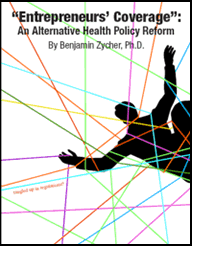This study examines the prospective implications of a national
public policy allowing individuals, families, and smaller groups to
purchase an entrepreneurs coverage policy free of the benefit
mandates imposed by state laws.

The study finds that if such
plans were offered to the public, enrollment would be about 8 percent
or 16.8 million individualsapproximately 13.6 now covered by private
policies and, conservatively, about 3.2 million now uninsured who are
ineligible for government programs. At the state level, the projected
entrepreneurs policy enrollment would range from a low of 1.6 percent
of those insured privately or uninsured in Idaho, to a high of 11.9
percent in Rhode Island.
Entrepreneurs coverage represents a
sharp departure from the policy proposals dominating the current public
discussion, said Dr. Zycher. The economic and political debate over
health care reform as it has evolved in Washington has one clear
characteristic: the absence of serious measures to make health care
coverage less expensive for the country. If a federally chartered
entrepreneurs health insurance policy is made available to the public,
free of mandated requirements, there would be real cost savings for the
nation.
Entrepreneurs coverage could also improve health
care by engendering competition in the market for health insurance,
thus decentralizing decision making and offering patients greater
choice. This form of coverage could represent an important step toward
restoring health insurance as protection against catastrophic events,
rather than as prepayment for medical services, and improve incentives
to economize on the consumption of medical services, Dr. Zycher said.

